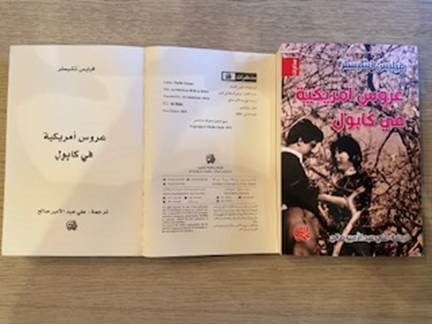An American Bride in Kabul is at my door—and she is speaking to me in Arabic.

by Phyllis Chesler
My book, An American Bride in Kabul, was published in Arabic about six months ago, but I had no copies in hand, nothing to marvel about, no way I could flip the pages, look at the photos of the girl who once had an 18” waist and who possessed an Afghan passport.
But now I can. Two books just arrived, via camel caravan, steamer ship, and far less enchanting express packaging. The cover is a romantic one and depicts me at twenty together with my Afghan boyfriend somewhere near our Bard College campus.
What a grand adventure it all was—a love story, really, not just between a man and a woman but between both of us in love with whole countries, entire cultures—he, intoxicated by the West, me, with the East. Oh, how many daring dreams were dashed; how many dangerous illnesses I, like most foreigners, contracted. Who could have imagined—not I—that I’d be held in posh captivity in a polygamous family without a passport back to the future. There was a time when I fully expected that I’d be buried in a cemetery near Kabul before I had a chance to do my world-work.
I also saw, up close, how women were treated—I’d never seen anything like it—and I never forgot it. My fiery American feminism was forged back there, in central Asia. Thus, when the Taliban again came to power and I was asked to help rescue Afghan girls and women—how could I resist? Personal experience, Jewish ethics, and feminist principle all combined and committed me to this life-saving mission. It felt destined, bashert, redemptive.
My freelance team rescued 400 girls and women, and I now have an Afghan granddaughter about whom I’ve written before. She is now a graduate student in America on a full scholarship and received all “A’s” in her classes. Her American grandmother is very proud.
Who knows? In another world, another time, I might very well have had an Afghan granddaughter….since the Western governments failed this moment in history, civilians had to step in, and step in we did—but then the task became impossible when all doors were closed to Afghans after Russia invaded Ukraine and refugees from that war began pouring into Europe.
And now, as I hold my book in Arabic, it seems to me that the greatest romance here is that of a writer’s words being translated into other languages. It’s pure magic to have one’s words and ideas span the globe. Some of my work has appeared in French, Spanish, Italian, German, Dutch, Danish, Swedish, Hebrew—and also in Japanese, Korean, Chinese, and Russian. In Arabic—that’s a real leap into the future, because I write about both women and Jews in Muslim countries, including, but not limited to Afghanistan.
I am beyond pleased.
It seems to me that my own personal romance with the East ought to be a movie. N’est-ce-pas?